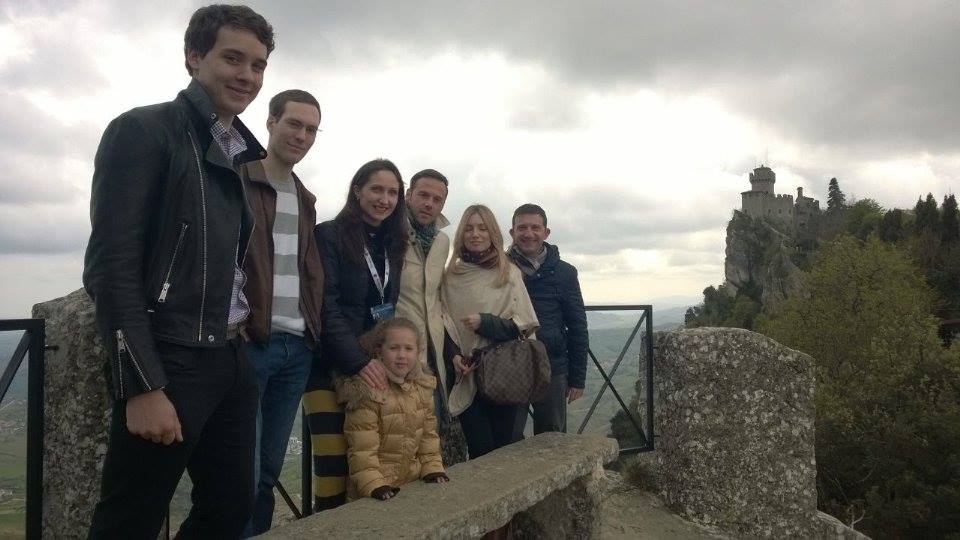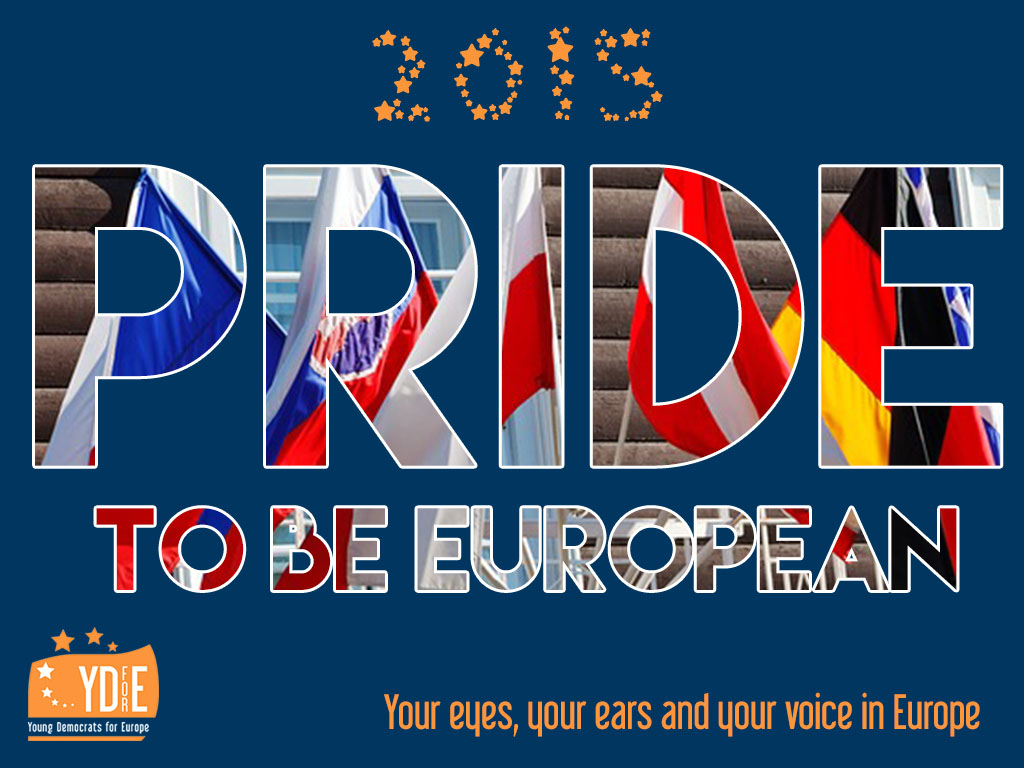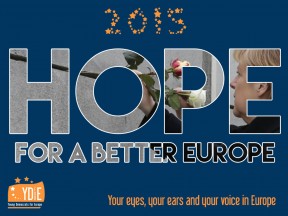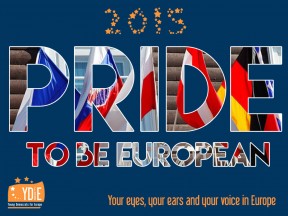Olivier Gloaguen, speaker for the YDE, had the occasion to take the floor to detail his practical experience of a Smart City, especially regarding the UK Model and a platform he designed during the last local elections in Fontenay le Fleury City (France).
This week-end also enabled us to know more about San Marino and meet our young friends from Alternativa Giovanile. We thank them for their invitation and we will be pleased to welcome them to other conferences we are organising at YDE European level.
First of all, and on behalf of the Young Democrats for Europe, I would like to thank you for inviting me to talk about smart cities and share with you a few thoughts about current and future development of smart cities
The example of smart cities development and support policy in the UK
I won’t comment in length, neither will I detail all British policies supporting smart cities development, that is not point here, but I would just like to take a few minutes first to share with you a couple of remarks on what I find to be a rather effective policy: a policy that strongly support entrepreneurship and innovative SMEs.
What I have discovered, is that from the very beginning, the British Government has been very keen in supporting, promoting and financing smart cities related projects, directly at the level of the Prime Minister, with the Government Office for Science. They have started, what is called, a “Foresight Program” entitled “Future of cities”. Foresight is prospective program aiming at exploring where the British innovation and related funding efforts should be channeled to So with such a program, the Government sends a very strong signal.
Very early one, the Government decided to bet on innovation and on the British (young) entrepreneurs They have launched a “Catapult centre”, an incubator of start-ups dedicated to the design of future cities and based in London. This incubator gathers SMEs and universities to foster innovation, with the immediate goal of developing, testing and commercializing operational solutions.
The UK has then put forward four “Future Cities Demonstrators” that have been selected through a competition and which have received extra funding (about £33 M in total) in order to implement several smart solutions and be used as live demonstrators. This process is twofold. First, it serves as a powerful communication tool and these four cities have been selected through a nationwide competitive process between about thirty candidates. This process forces the cities to compete and challenge their imagination to propose the most cutting-edge and innovative projects.
I just wanted to mention this example of support policy as I think it is an example of a rather good policy as it gathers a strong political will, translating into effective support schemes and most crucially, into practical implementation involving SMEs and start-ups.
Deploying smart technologies in a small city
This first experience taught me something: if one wants to deploy prospective smart technologies into cities, one must by all means support innovative SMEs.
Is it possible to deploy smart city technologies and applications in a rather small city of about 13,000 inhabitants, with limited budget resources? I believe it is possible. However, you must rely on the smartness of inhabitants first.
For instance, you can deploy an application available on smart phones and connected to the website of the city, which would allow people to map any issue they can spot in the streets. Imagine that you see an overflowed trash bin, a new graffiti on a wall, a leaking water tap, a hole on the street or a fallen tree branch that obstructs the pavement. You just take a picture of it and send it via your smart phone application, with a small comment. The problem is located on the map, with a small report form appearing that describes the location, the time and date as well as the comment left by the user. Everybody can then see this kind of information, as it freely available on the map. The appropriate department of the municipality services immediately receives the information and can act about it to solve the problem. Furthermore, the maintenance service answers the request, with a comment that appears on report form located on the map and that everybody can see as well. All the users can therefore know that the city services are aware of the issue and know within which period of time they plan to solve the problem.
What I have discovered through my discussions with the inhabitants is that they generally do not expect or even request the problem to be solve immediately and not even within the next few hours or maybe days. No, what they really want to know is that their request is truly taken into account as well as to know when the problem is planned to be solved and to get a feedback. Such a map allows interaction between the users and the city services, through the comments and the answers provided by the services and publically available on the map. Providing regular updates on the follow-up of your request is crucial, as it fulfills the basic – and right – expectation of the citizens, that because they pay taxes they should have in return a proper service. Moreover, the way people are reporting a particular issue also provides valuable information on the urgency of the problem and the efforts that should be put in solving it. If in a matter of a few hours, the services receive tens of reports, it means that something must be done immediately.
This map can become much more than just a map to localize broken thing. It could indeed become the core of a platform where a lot of information can be shared between elected officials and the citizens, but also between the inhabitants themselves.
Moreover, one should always put forward the idea of contracting the development of such an online application to a young start-up, or even, maybe, to young entrepreneurs, if possible. It is, of course, much easier and much more secure to just buy off-the-shelf technologies from established big firms, but I believe that local officials can create much more value added by contracting the development of such smart tools (like an online interactive platform) to young entrepreneurs. They constitute the future, they have the potentiality of creating jobs, they have ideas, but they often lack the first few contracts that would allow them to develop and commercialize their concept. And, you could even attract them to settle in your city, with new jobs at the end of the day!
Another application, that can be related to the interactive mapping of the city is the possibility offered of ratting things. In some particular places, a sticker would inform the passer-by that they can give their opinion on something. Using the app, people flash a QR-code and they can rate the thing in question, with the possibility to make a public comment, which will then appear on the interactive digital map of the city.
As you all well know, the concept of smart city mainly rely on sensors, that is on the ability to gather a many pieces of information from various sources, mix them, analyze them and then use it, in order to provide better services and infrastructures. Of course, the ultimate goal is to deploy this kind of sensors. But deploying a network of wireless sensors is quite expensive and a small city like ours could not afford it. Apart of easing and encouraging the communication between the local administration and the inhabitants, this is precisely one of the reasons why we opted for an interactive map through a smart phone app: all the inhabitants would thus become the ‘smart sensors’ of our smart city!
Another aspect related to smart city, is linked with open data. I won’t develop this topic in large, but I will just mention a couple of things about this proposition. The idea was to make most, if not all, the data related to the management of the city publically available
You can make the citizens true actors of the major decisions taken by the city. Let me explain how. Local governments are facing a massive reduction of subsidy from the central Government. This means that one of the main sources of revenues (alongside local taxes) is severely constrained and therefore complicated choices must often be made between several projects, when they cannot all be funded.
For instance, the main issue could be about the construction of a new municipal swimming pool as well as the rehabilitation of the city centre, an investment of several millions Euros. It was rather obvious that if a municipality were committing in building them, this would have implied holding back other projects or raising up the level of local taxes. When talking with the inhabitants, their opinion on whether the city should spend several millions euros in a new swimming pool were quite diverse, but they were also changing when exposed to the constraints of such a choice. So we quickly decided that on major decisions like this one, involving important choices, we shall ask the opinion of the population through local referenda. However, such a choice must also be an informed one. That is where it links with the open data concept: all the relevant information about such a project would be made public, through digital support and an interactive process would have been systematically initiated between elected officials and the citizens.
As you would agree, such propositions were not revolutionary, but they adapt the concept of a smart city to the realities of a rather small city with very limited resources. As I explained, that is precisely why one should mainly rely on an interactive online map linked to a mobile application. Small cities cannot deploy easily and quickly a large network of sensors (in the street, on parking lots, attached to street lights, etc.) as it represents an important investment.
I do believe that a small city can become smart to a lesser cost to the public finances. Developing a digital map, enrich it with already existing databases, and making freely available an application that everybody can download into his own mobile phone, is not that expensive.
Furthermore, in a relatively small city of just 13,000 inhabitants, people can still know each other, which means that interactions between people exist and therefore can only be encouraged and favored via such an interactive online platform. The aim should not only to build a rich interactive map, but also (and maybe mainly) to create a lively local community that can encourage the share of information and services between them.
Of course, such an interactive platform should be seen as the first steps toward a truly smart city by the full scale deployment of sensors and connected objects, as well as the expansion of big data analysis. Although it constitutes a first, rapid to deploy, not too expensive but also easy to be understood, used and likely to be adopted by local inhabitants.
More general thoughts about smart cities, democracy and the role of the youth
To conclude my talk, I would like to share with you a few thoughts about the development of smart cities, the technologies attached and their relation with local democracy.
No need to present again all the benefits that could be brought to local democracy, I have mentioned several of them through the examples I presented earlier. It is very clear to me that the development of smart city can constitute a formidable asset to reinforce local democracy, thanks to an increased implication of local citizens / inhabitants in the day-to-day life of their city, but also by accessing new open sources of data providing a detailed insight on how the city management works.
But one must also keep in mind that democracy should never, ever, be taken as granted forever. Democracy is a very fragile form of Government. I want to underline, here, that such a shift from democracy to a more authoritarian society may not need to be intentional and that citizens may not necessarily be fully aware of it, or even against it. One should just think of recent threats to security that trigger increased power devoted to the police, the intelligence community and counter-terrorism agencies.
The development of smart cities brings a new aspect to it. Smart cities involve creating extremely powerful tools, which if badly used, could create serious threats to democracy. I believe there are not so many steps between “smart cities” and “dark cities”.
Indeed, the whole concept of smart city is based on data. More precisely, it is based on the ability to gather a lot of data from a lot of varied sources (through a network of all kind of sensors, but also from the users themselves); to mix them all and finally to cross-analyze them and get valuable information. Compared to what exists today, the main difference resides in the fact that we mix different databases that are currently separated, for instance traffic, social networks, CCTV, emergency vehicles localization, weather, local energy consumption and so on.
The potential danger precisely resides in the bridges and connection that are built between several pieces of information that may appear, at first sight, to be unrelated, but that may in fact provide a lot of information when crossed with each other.
When misused, access to this kind of information may reveal to be a very effective tool to control, monitor or even influence people. Mixing this with a government with authoritarian tendencies, you get a potentially deadly threat to democracy itself.
I think that one should always keep in mind that the next generation of dictatorships – or maybe is it already the current one like in China – is likely to heavily rely on big data as well as on the diversion of smart tools into smart bad tools.
Never forget that technology is rarely bad or dangerous in itself. What makes it bad and dangerous is the use that we – both citizens and government – decide to make of it.
Of course, I do not think that we should limit or constrain the development of smart city related technology, but I do believe that we ought to be particularly vigilant and build from the very beginning all the appropriate safeguards: proper democratic control on all these systems, high level of transparency, attention given to the way it is funded by the private sector, control and regulation of the private partners that can have access to very sensitive and personal data and so on.
From that perspective, I think that the young generations have a particular and important role to play. First, since we are the ones who are especially concerned, as we will be the future inhabitants of all the smart cities that are currently designed and we will all depend on the attached technologies. Secondly, because we were born at the same time than most of the core technologies used in smart cities: Internet, mobile phone, social networks, big data. This makes us particularly aware of how all these technologies works and more importantly aware of some of the dangers attached to them.
Finally and to conclude on a more positive tone, the development of smart cities and of all the related technologies, applications, mobile devices or innovative software, constitutes an immense opportunity for young entrepreneurs with cutting-edge innovation ideas that are ready to develop their business, to make it grow, to create value and jobs. I think this is where the smartest opportunity lies for the young generation!
Thank you for your attention.
Olivier Gloaguen (@OlivierGloaguen)
Researcher and expert of the French Ministry of Budget.








